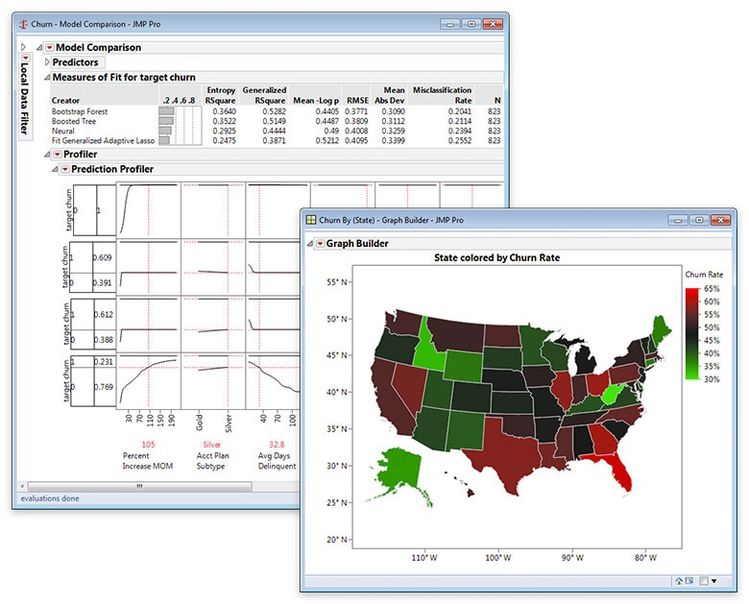- JMP User Community
- :
- Blogs
- :
- JMP Blog
- :
- Marketing in a digital age: The democratisation of analytics
- Subscribe to RSS Feed
- Mark as New
- Mark as Read
- Bookmark
- Subscribe
- Printer Friendly Page
- Report Inappropriate Content

"Marketing is on the cusp of a radical change in what it does in order to meet its mission of ensuring firms adjust to rapidly changing customer needs and wants," says Stan Maklan. And data analytics is at the core of this change. But you don't have to be a data scientist to analyse marketing data.
Stan teaches data analytics to non-statisticians at Cranfield's Centre for Strategic Marketing and Sales in the UK. He will be presenting a seminar, "Marketing in a Digital Age: The Democratisation of Analytics," on Nov. 29 in London. You can sign up for it here, or if you are not in London, register here to see the live streaming online. I asked Stan a few questions beforehand:
Data analysis is not a priority of most marketing directors. You think it should be. Why?
I would challenge the premise somewhat. Anecdotally, I think CMOs are very much into analytics these days, it certainly is the “mot du jour.” This is tied into the broader investment picture in data science and marketing technology. Marketing may be the biggest investor in analytics and automation amongst the functional groups today, so clearly this is on the CMO agenda.
However, I suspect that there are a number of ways for companies to build the capability within marketing and here is where I think there is more variation in practice. My research on CRM, the previous big IT-enabled marketing change, concluded that marketing failed to build the ability to analyse customer data and leverage the technology BEFORE investing in CRM systems. Hence, at least initially, surveys suggest that companies were disappointed with the results from their investments. The way to ensure real benefit from investment in big data is to transform – over time – how we practice marketing so that ordinary marketers can engage fully and improve their practice. For such a broad engagement, we must democratise analytics/big data. The alternative of creating a separate, highly qualified analytics function that parses out its scare resource amongst competing business functions does not seem like a way to transform the practice of marketing.

You teach non-statisticians how to explore their data with JMP at Cranfield. What’s the advantage of using a software tool like JMP?
It takes one to know one! I am not a statistician either. My professional career begain in classic consumer goods marketing. So perhaps I am empathetic as well as sympathetic to our learners who have a limited foundation in mathematics and statistics. I took the initiative to create a module called “Big Data – Marketing Analytics” some years ago because I thought we would be doing a disservice to our learners if they graduated without some capability upon which they could build. Very quickly, I realised that one needed an analytic package upon which to base the teaching – so that it was pragmatic, interactive and there were cycles of learning and doing. It struck me that this was really easy to use and that one could be operational after just a few hours of practice and instruction. The online support of JMP is superb, and I was able to build a module with some help with a consultant I knew who works with JMP. Learners need hands-on experience to learn analytics, and JMP’s design matches to the idea of democratisation of analytics. We get our learners doing good analysis very quickly, and I think this builds confidence. Indeed, many of our MSc graduates have moved into both analytic and big data roles when they have graduated.
What do you hope for people to take away from the seminar on Nov. 29?
I will explore this theme of democratising analytics, transforming practice through wide-spread adaption of analytic tools and practices. Marketing is on the cusp of a radical change in what it does in order to meet its mission of ensuring firms adjust to rapidly changing customer needs and wants. The change programme required within marketing should not be underestimated, and I hope to encourage attendees to champion these ideas within their organisations. I also hope that they get an insight to my views of how marketing practices will evolve and the implications for analytics within their organisations.
Don't miss Stan Maklan's seminar on Nov. 29. Sign up here for the event in London, or here to see the live streaming online.
- © 2024 JMP Statistical Discovery LLC. All Rights Reserved.
- Terms of Use
- Privacy Statement
- About JMP
- JMP Software
- JMP User Community
- Contact

You must be a registered user to add a comment. If you've already registered, sign in. Otherwise, register and sign in.